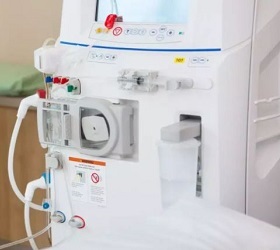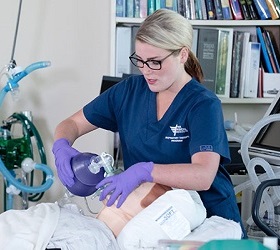Here you’ll find the highest paid healthcare careers which do not require post-graduate education.

Dialysis Technician
Dialysis technicians monitor and maintain the dialysis equipment in the laboratory. In addition, these are primary caregivers to patients who have dialysis treatment.
- Median Salary: $38,217
- Years of School: 1
- Job Outlook: Average

EKG Technician
EKG technicians test and monitor the cardiovascular system (heart).
- Median Salary: $36,256
- Years of School: 0-1
- Job Outlook: Excellent

Medical Technician
Medical technicians not only collect bodily samples but also assist medical technologists in testing and analyzing the samples collected.
- Median Salary: $50,151
- Years of School: 2
- Job Outlook: Average

Medical Technologist
Medical technologists collect samples from patients, analyse and test them to give a detailed report.
- Median Salary: $66,513
- Years of School: 4
- Job Outlook: Average

Respiratory Therapist
Respiratory therapists treat and take care of patients who have breathing problems.
- Median Salary: $64,706
- Years of School: 2-4
- Job Outlook: Excellent

Surgical Technologist
Surgical technologists (also known as operating rooms technicians), their main duties include preparing operating rooms and assisting nurses and doctors in surgical procedures.
- Median Salary: $43,878
- Years of School: 1-2
- Job Outlook: Average

Ultrasound Technician
Ultrasound technicians help physicians in monitoring and diagnosing patients in the laboratory through the use of ultrasonic imaging technology.
- Median Salary: $72,328
- Years of School: 2-4
- Job Outlook: Excellent

Healthcare Administration
Healthcare administrators do not work directly with patients, they manage divisions within hospitals, clinics and doctors's offices.
- Median Salary: $75,470
- Years of School: 4+
- Job Outlook: Good

Home Health Aide
Home health aides take care of individuals in their homes and assist with their daily routine.
- Median Salary: $24,252
- Years of School: 0-1
- Job Outlook: Excellent
Healthcare Practitioners & Technical Occupations Growth Projections
The Bureau of Labor Statistics published growth projections showing the average workforce will grow in about 6.5% in the next 10 years.
However, healthcare practitioners & technical occupations are at the top of the statistics and the field has a 16.4% expected growth for the next 10 years.
Choosing Careers In Healthcare
With the numerous number of careers to choose from, healthcare careers are amongst the most rewarding.
Now, before you choose a healthcare career, you need to take your time and do a thorough research.
This will help you consider different factors that might determine the choice you will make.
In addition, you can seek opinion and advice from a professional if you don’t know how to go about it.
Here are the 5 most important factors you need to consider when choosing a healthcare career:
#1 Your Current Financial Situation
This is the first factor you need to put into consideration because it will determine the college you will join, your college lifestyle and the course you will enroll to.
Your current financial situation will also determine your life after you’ve graduated because you might have to pay off debts or loans.
Therefore, when considering your financial ability, determine your ability to earn income while studying, your savings and your ability to get loans, grants or credit from a reliable financial institution.
#2 Earning Potential
Earning potential not only refers to your salary but also achieving your goals and ambitions.
The career you choose should be able to offer you a good salary to enable you to compensate for the time, resources and time you spent studying.
If your career is well paying, you will be motivated to work hard or even further your education to earn more and achieve your set goals.
However, when it comes to considering your earning potential, avoid looking at entry-level salaries only because they might mislead you.
Some careers have attractive entry salaries but later on, you will end up having a lower salary range as you work.
On the other hand, some careers may have lower – entry salaries but as you gain experience and work, your salary growth potential increases.
Here’s something you’d probably want to know:
Average wage for healthcare practitioners & technical occupations:
| Avg. Hourly Wage | $38.06 |
| Avg. Annual Wage | $79,160 |
#3 Years of Education
Considering the years you will be studying helps you assess your financial ability and your chances of graduating.
Healthcare careers have different requirements depending on the field you are interested in.
Some careers require you to have a High School diploma only while others require you to have a bachelor’s degree, 2-year associate degrees or even a post-graduate degree.
You need to know the number of years the course you are interested in will take to determine whether you will be able to enroll and graduate.
The number of years you will study will help you know whether you can afford to pay tuition fees, support yourself throughout and pay for other miscellaneous expenses.
Depending on your financial situation, you can also determine whether to take a full time or part time course to meet your financial needs.
#4 Online Schools vs. Local Schools
With most people being busy with work, kids or other commitments, joining an online school is one of the ways to save time and resources.
It is, therefore, possible to study while working or study away from a college and still graduate.
However, you need to understand that not all programs are offered through online schools.
In fact, some programs can offer a part of their curriculum online but you will have to attend a local school for clinical training.
What’s the bottom line?
It’s important to research about the course you are taking before enrolling into an online school.
#5 Work/Life Balance & Passion
Finally, you balancing work and life is extremely important.
Although some careers might be well paying, you might have less or no time with your family or hobbies.
This is not the right healthcare career because life is more than making money and working.
You should also choose a career you are passionate about because passion, commitment and hard work go hand in hand.
You may seek professional help if you cannot make the right decision on your own.
It is important to understand that when choosing a career you are making a lifetime decision.
Hence, you should be very cautious to make the right choice because regretting later might be a problem.
If you make the wrong career choice, you will not only waste your time but resources that you could have spent elsewhere.
How can you make the right choice?
You better take your time to look for a career:
- Which is rewarding enough for you.
- You are passionate about.
- Will not take much of your time and you can balance with your personal life.
- You believe you can achieve through studying.
The good news is that there are numerous careers to choose from, all you need is to research and take your time to make the right choice.
Good Luck!